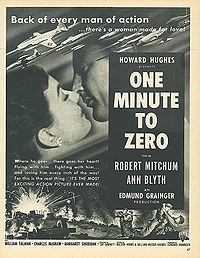
ONE MINUTE TO ZERO
US, 1952, 105 minutes, Black and white.
Robert Mitchum, Ann Blyth, William Talman, Charles Mc Graw, Richard Egan, Eduard Franz.
Directed by Tay Garnett.
One Minute to Zero was filmed during the Korean war and is a morale-boosting film for the American public. It highlights the background of the war, the Iron Curtain and the cold war, the invasion of the North Koreans across the 38th Parallel with the backing of Soviet Russia. It shows the American troops there training the Koreans as well as helping them in the attack. The film ends with the successful landing at Inchon.
The film is a standard war film, in the vein of the films of World War Two. It focuses on a particular group, led by Robert Mitchum with some authority. Ann Blyth is the romantic interest – though a strong character, employed by the United Nations. William Talman (the villain in The Hitch Hiker in the following year as well as Perry Mason’s adversary in the television series) is the colonel. There is good support from Charles Mc Graw and Richard Egan.
The film was directed by Tay Garnett, a veteran of many MGM films including Valley of Decision and The Postman Always Rings Twice. He worked with Mitchum in the IRA film of 1960, A Terrible Beauty.
The film is interesting in view of the subsequent history of divided Korea, especially of the isolation of North Korea, its threats to the South, its threats to world stability with its nuclear ambitions.
1. Interesting war film? In the tradition of war films? The focus on a small group, their action representing overall action?
2. The black and white photography, the re-creation of Korean locations, the mountains, the desert, Seoul? The re-creation of battles, air strikes, the processions of refugees? The musical score – and Victor Young’s famous song, ‘When I Fall In Love, It Will Be Forever’?
3. The historical background of the Korean war, the aftermath of World War Two, the defeat of the Japanese? The cold war? Russia and its influence in the east? Mao Tse Tung and communist China in 1949? Chinese backing, Russian backing, the invasion of the North Koreans? The infiltration in the refugee streams? The arms supplied by the communist powers? America and its decision to support Korea? The presence of the Americans as trainers? Supporting the Korean forces? The invasion of Inchon and the end of the war? The 38th Parallel and the division between the two Koreas?
4. Robert Mitchum as Steve Janowski? His being in his thirties, an authoritative figure? His war record? Demonstration of shooting the tank? Baker and his response to him? Joe Parker and his reliance on him? The encounter with Linda Day, the clashes, the discussions about the war and whether it was possible or not, the role of the United Nations? The encounters – and him stranded in the corridor? His finally lifting her and putting her on the plane? His strategies and tactics? With his men, under fire? His injuries, hospital, Linda coming to see him? The predictions that they would fall in love? The romance, in love, her story about her husband and his death, her not wanting to risk another romance and hear the news of death? The invasion of the North Koreans, the strafing of airports etc? The line of refugees, Steve and his taking over, his men, ordering them to fire, the danger of killing civilians, the fact of the civilians killed, Linda’s reaction? The reaction to his decision? The film’s justification of collateral damage? The appeal to deaths and injuries of American troops? (And the continued use of this argument over the decades?) His finally encountering Linda, her change of heart, a future together? His work in the war in the future?
5. Colonel Parker, lecturer, strategist, in command, the relationship with Steve, the discussions, the men, his own family background, his wife? Work in Korea, hard decisions? The other officials and the meetings, letting Steve have charge of operations with the refugees?
6. The ordinary troops, Baker, his loyalty, in the battles? Major Ralston and his service? The other men? The wives at home? Ralph, his eagerness, his death? The deaths of the troop, the few survivors? The spirit of the men?
7. Linda, the United Nations work, medical help? Her work with Doctor Engstrand? On-site, having to move, the refugees? Her gratitude to Steve for putting her on the plane? The return, falling in love, the scenes together – and singing together in the restaurant? Her dismay at the death of the civilians? Her not signing the paper commending Steve, listening to the arguments, her praying in the church?
8. The conventional characters of a war film? Familiar material? Well crafted – and of relevance, particularly in its time in the early 1950s?